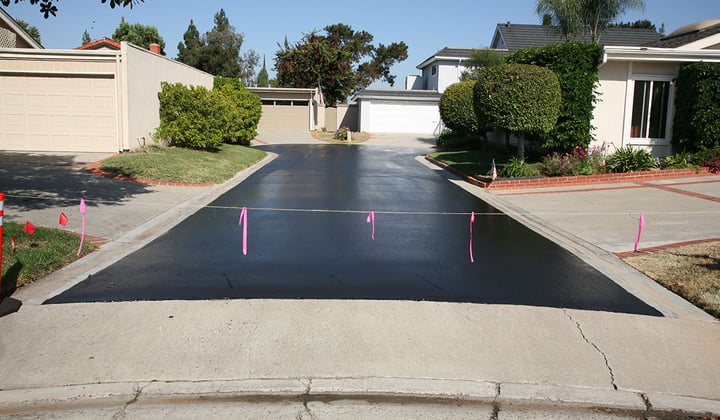Change Your Residential property's Aesthetics: Commercial Car Park Paving and Asphalt Sealing Solutions
Change Your Residential property's Aesthetics: Commercial Car Park Paving and Asphalt Sealing Solutions
Blog Article
Hot Mix Asphalt: A Lasting Service for Pavement
Warm Mix Asphalt (HMA) has actually emerged as a leading lasting choice for pavement solutions, using a myriad of ingenious technologies and environmental benefits. As the need for green construction techniques grows, checking out the nuances of HMA's sustainability can supply beneficial understandings into the future of sidewalk services.
Ecological Benefits of Warm Mix Asphalt

Additionally, Warm Mix Asphalt assists to minimize city heat island impacts. Its dark shade takes in sunshine, minimizing the quantity of warmth mirrored back right into the environment compared to lighter-colored pavements. This can decrease ambient temperature levels in urban locations, lowering the demand for cooling and inevitably reducing power consumption.
On top of that, Hot Mix Asphalt adds to enhanced stormwater management. Its porous nature permits water to infiltrate the pavement and recharge groundwater supplies, reducing runoff and the threat of flooding. These environmental benefits make Hot Mix Asphalt a lasting choice for paving highways and roadways.
Energy Effectiveness in HMA Manufacturing
Is energy efficiency an essential consider the manufacturing of Warm Mix Asphalt (HMA)? Absolutely. Energy plays a considerable function in the production of HMA, impacting both cost and environmental sustainability. One key facet of energy effectiveness in HMA production is the use of cozy mix asphalt (WMA) technologies (commercial parking lot paving). WMA enables the blending and positioning of asphalt at reduced temperatures contrasted to standard warm mix asphalt, causing reduced power usage during manufacturing. This process not only decreases gas use however likewise lowers greenhouse gas emissions, making it a more eco pleasant choice.
Furthermore, innovations in plant innovations have actually caused even more energy-efficient HMA manufacturing processes. Modern plants are made with features like recycled asphalt sidewalk (RAP) handling capacities, reliable burner systems, and improved insulation, all adding to energy financial savings. By maximizing power usage in HMA manufacturing, the market can decrease its carbon impact while keeping top notch sidewalk materials. Energy effectiveness is, consequently, an important factor to consider in guaranteeing the sustainability of Hot Mix Asphalt production.
Recyclability of Hot Mix Asphalt
The recyclability of Hot Mix Asphalt (HMA) is a pivotal element of its sustainability and long-term ecological impact. HMA is just one of one of the most recycled products in the United States, with over 100 million loads of redeemed asphalt pavement (RAP) being recycled annually in new pavement building and construction. Recycling HMA offers numerous environmental advantages, such as lowering the demand for virgin products, decreasing energy intake during production, and decreasing the amount of waste sent to landfills.
The process of recycling HMA entails crushing the existing sidewalk, crushing it right into smaller sized pieces, and mixing it with brand-new accumulation and asphalt binder to create a recycled mix. This recycled mix can frequently perform in addition to or also much better than traditional HMA, while requiring less basic materials and producing reduced greenhouse gas emissions. By including RAP into new pavement projects, roadway firms can preserve natural deposits, decrease prices, and lessen the ecological footprint of road construction and maintenance tasks. In general, the recyclability of HMA plays a significant duty in advertising lasting methods within the sidewalk sector.

Long-Term Performance of HMA
Asphalt sidewalks demonstrate resilience and strength over an extensive duration, showing the lasting performance of Warm Mix Asphalt (HMA) Additionally, advancements in HMA technology, such as the usage of polymer-modified binders and cozy mix asphalt, have further enhanced the durability and longevity of HMA sidewalks. By prioritizing quality building and upkeep practices, HMA proceeds to prove itself as a sustainable and affordable solution for lasting sidewalk framework.

HMA: Resilience and Sustainability
Demonstrating both resilience and sustainability, Hot Mix Asphalt (HMA) has actually become a foundation in the building of resilient pavement facilities - commercial parking lot paving. HMA's sturdiness comes from its here capability to see here withstand hefty tons, harsh weather conditions, and high website traffic volumes, making it a reliable selection for roadways, freeways, and airport runways. The structure of HMA, which generally includes aggregates, binder, and filler, plays a vital duty in improving its long life and resistance to put on and tear
Furthermore, HMA's sustainability lies in its recyclability and energy-efficient manufacturing procedure. The capability to reuse redeemed asphalt sidewalk (RAP) in brand-new HMA blends reduces the demand for virgin products and reduces the ecological impact of pavement building and upkeep. Additionally, the energy efficiency of creating HMA depends on its lower blending temperatures compared to other pavement products, resulting in decreased energy usage and greenhouse gas exhausts.
Conclusion
Finally, warm mix asphalt (HMA) offers a lasting option for sidewalk with its eco-friendly features. HMA's recyclability, energy efficiency in production, and long-term toughness make it a green choice for roadway construction. By conserving natural deposits, minimizing waste, and decreasing greenhouse gas exhausts, HMA plays an important role in advertising sustainability in framework advancement. Its ability to minimize metropolitan heat island results better highlights its significance in producing eco aware and resistant pavement systems.
HMA is one of the most recycled materials in the United States, with over 100 million heaps of recovered asphalt pavement (RAP) being recycled annually in brand-new sidewalk building and construction.The procedure of reusing HMA entails crushing the existing pavement, crushing it into smaller sized pieces, and mixing it with brand-new aggregate and asphalt binder to create a recycled mix.Asphalt sidewalks demonstrate resilience and durability over a prolonged period, showing the long-term performance of official source Warm Mix Asphalt (HMA) Furthermore, improvements in HMA modern technology, such as the usage of polymer-modified binders and warm mix asphalt, have actually additionally improved the durability and long life of HMA sidewalks. The capability to recycle recovered asphalt pavement (RAP) in new HMA mixtures minimizes the demand for virgin products and decreases the ecological influence of sidewalk building and upkeep.
Report this page